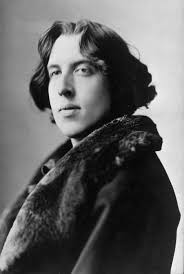The Picture of Dorian Gray Page #34
The Picture of Dorian Gray is a Gothic and philosophical novel by Oscar Wilde, first published complete in the July 1890 issue of Lippincott's Monthly Magazine. Fearing the story was indecent, prior to publication the magazine's editor deleted roughly five hundred words without Wilde's knowledge.
He shuddered, and for a moment he regretted that he had not told Basil the true reason why he had wished to hide the picture away. Basil would have helped him to resist Lord Henry's influence, and the still more poisonous influences that came from his own temperament. The love that he bore him--for it was really love--had nothing in it that was not noble and intellectual. It was not that mere physical admiration of beauty that is born of the senses and that dies when the senses tire. It was such love as Michelangelo had known, and Montaigne, and Winckelmann, and Shakespeare himself. Yes, Basil could have saved him. But it was too late now. The past could always be annihilated. Regret, denial, or forgetfulness could do that. But the future was inevitable. There were passions in him that would find their terrible outlet, dreams that would make the shadow of their evil real. He took up from the couch the great purple-and-gold texture that covered it, and, holding it in his hands, passed behind the screen. Was the face on the canvas viler than before? It seemed to him that it was unchanged, and yet his loathing of it was intensified. Gold hair, blue eyes, and rose-red lips--they all were there. It was simply the expression that had altered. That was horrible in its cruelty. Compared to what he saw in it of censure or rebuke, how shallow Basil's reproaches about Sibyl Vane had been!--how shallow, and of what little account! His own soul was looking out at him from the canvas and calling him to judgement. A look of pain came across him, and he flung the rich pall over the picture. As he did so, a knock came to the door. He passed out as his servant entered. "The persons are here, Monsieur." He felt that the man must be got rid of at once. He must not be allowed to know where the picture was being taken to. There was something sly about him, and he had thoughtful, treacherous eyes. Sitting down at the writing-table he scribbled a note to Lord Henry, asking him to send him round something to read and reminding him that they were to meet at eight-fifteen that evening. "Wait for an answer," he said, handing it to him, "and show the men in here." In two or three minutes there was another knock, and Mr. Hubbard himself, the celebrated frame-maker of South Audley Street, came in with a somewhat rough-looking young assistant. Mr. Hubbard was a florid, red-whiskered little man, whose admiration for art was considerably tempered by the inveterate impecuniosity of most of the artists who dealt with him. As a rule, he never left his shop. He waited for people to come to him. But he always made an exception in favour of Dorian Gray. There was something about Dorian that charmed everybody. It was a pleasure even to see him. "What can I do for you, Mr. Gray?" he said, rubbing his fat freckled hands. "I thought I would do myself the honour of coming round in person. I have just got a beauty of a frame, sir. Picked it up at a sale. Old Florentine. Came from Fonthill, I believe. Admirably suited for a religious subject, Mr. Gray." "I am so sorry you have given yourself the trouble of coming round, Mr. Hubbard. I shall certainly drop in and look at the frame--though I don't go in much at present for religious art--but to-day I only want a picture carried to the top of the house for me. It is rather heavy, so I thought I would ask you to lend me a couple of your men." "No trouble at all, Mr. Gray. I am delighted to be of any service to you. Which is the work of art, sir?" "This," replied Dorian, moving the screen back. "Can you move it, covering and all, just as it is? I don't want it to get scratched going upstairs." "There will be no difficulty, sir," said the genial frame-maker, beginning, with the aid of his assistant, to unhook the picture from the long brass chains by which it was suspended. "And, now, where shall we carry it to, Mr. Gray?" "I will show you the way, Mr. Hubbard, if you will kindly follow me. Or perhaps you had better go in front. I am afraid it is right at the top of the house. We will go up by the front staircase, as it is wider." He held the door open for them, and they passed out into the hall and began the ascent. The elaborate character of the frame had made the picture extremely bulky, and now and then, in spite of the obsequious protests of Mr. Hubbard, who had the true tradesman's spirited dislike of seeing a gentleman doing anything useful, Dorian put his hand to it so as to help them. "Something of a load to carry, sir," gasped the little man when they reached the top landing. And he wiped his shiny forehead. "I am afraid it is rather heavy," murmured Dorian as he unlocked the door that opened into the room that was to keep for him the curious secret of his life and hide his soul from the eyes of men. He had not entered the place for more than four years--not, indeed, since he had used it first as a play-room when he was a child, and then as a study when he grew somewhat older. It was a large, well-proportioned room, which had been specially built by the last Lord Kelso for the use of the little grandson whom, for his strange likeness to his mother, and also for other reasons, he had always hated and desired to keep at a distance. It appeared to Dorian to have but little changed. There was the huge Italian cassone, with its fantastically painted panels and its tarnished gilt mouldings, in which he had so often hidden himself as a boy. There the satinwood book-case filled with his dog-eared schoolbooks. On the wall behind it was hanging the same ragged Flemish tapestry where a faded king and queen were playing chess in a garden, while a company of hawkers rode by, carrying hooded birds on their gauntleted wrists. How well he remembered it all! Every moment of his lonely childhood came back to him as he looked round. He recalled the stainless purity of his boyish life, and it seemed horrible to him that it was here the fatal portrait was to be hidden away. How little he had thought, in those dead days, of all that was in store for him! But there was no other place in the house so secure from prying eyes as this. He had the key, and no one else could enter it. Beneath its purple pall, the face painted on the canvas could grow bestial, sodden, and unclean. What did it matter? No one could see it. He himself would not see it. Why should he watch the hideous corruption of his soul? He kept his youth--that was enough. And, besides, might not his nature grow finer, after all? There was no reason that the future should be so full of shame. Some love might come across his life, and purify him, and shield him from those sins that seemed to be already stirring in spirit and in flesh--those curious unpictured sins whose very mystery lent them their subtlety and their charm. Perhaps, some day, the cruel look would have passed away from the scarlet sensitive mouth, and he might show to the world Basil Hallward's masterpiece.
Translation
Translate and read this book in other languages:
Select another language:
- - Select -
- 简体中文 (Chinese - Simplified)
- 繁體中文 (Chinese - Traditional)
- Español (Spanish)
- Esperanto (Esperanto)
- 日本語 (Japanese)
- Português (Portuguese)
- Deutsch (German)
- العربية (Arabic)
- Français (French)
- Русский (Russian)
- ಕನ್ನಡ (Kannada)
- 한국어 (Korean)
- עברית (Hebrew)
- Gaeilge (Irish)
- Українська (Ukrainian)
- اردو (Urdu)
- Magyar (Hungarian)
- मानक हिन्दी (Hindi)
- Indonesia (Indonesian)
- Italiano (Italian)
- தமிழ் (Tamil)
- Türkçe (Turkish)
- తెలుగు (Telugu)
- ภาษาไทย (Thai)
- Tiếng Việt (Vietnamese)
- Čeština (Czech)
- Polski (Polish)
- Bahasa Indonesia (Indonesian)
- Românește (Romanian)
- Nederlands (Dutch)
- Ελληνικά (Greek)
- Latinum (Latin)
- Svenska (Swedish)
- Dansk (Danish)
- Suomi (Finnish)
- فارسی (Persian)
- ייִדיש (Yiddish)
- հայերեն (Armenian)
- Norsk (Norwegian)
- English (English)
Citation
Use the citation below to add this book to your bibliography:
Style:MLAChicagoAPA
"The Picture of Dorian Gray Books." Literature.com. STANDS4 LLC, 2024. Web. 27 Nov. 2024. <https://www.literature.com/book/the_picture_of_dorian_gray_869>.




Discuss this The Picture of Dorian Gray book with the community:
Report Comment
We're doing our best to make sure our content is useful, accurate and safe.
If by any chance you spot an inappropriate comment while navigating through our website please use this form to let us know, and we'll take care of it shortly.
Attachment
You need to be logged in to favorite.
Log In